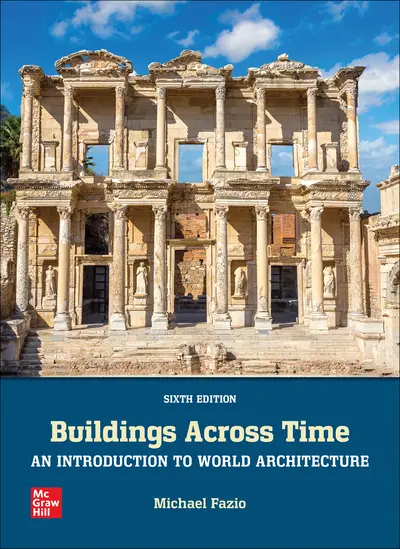My Account Details

ISBN10: 1264299842 | ISBN13: 9781264299843

* The estimated amount of time this product will be on the market is based on a number of factors, including faculty input to instructional design and the prior revision cycle and updates to academic research-which typically results in a revision cycle ranging from every two to four years for this product. Pricing subject to change at any time.
Instructor Information
Quick Actions (Only for Validated Instructor Accounts):
Buildings Across Time brilliantly explores the essential attributes of architecture by uniquely combining both a detailed survey of Western architecture, including Pre-Columbian America, and an introduction to architecture from the Middle East, India, Russia, China, and Japan. Authors have searched out the stories these buildings have to tell, considered the intentions of the people who built them, and examined the lives of those who used them.
The text contains extensive descriptive narrative leavened with focused critical analysis, which both allows the book to stand alone and invites lecturers to impose their studied interpretations on the material without the danger of undue ambiguity or conflict. In a world that grows smaller by the day, it presents a global perspective, and in a discipline that concerns built objects that are often beautiful as well as functional, it is copiously illustrated, intelligently designed, and consistently usable.
INTRODUCTION
CHAPTER 1 THE BEGINNINGS OF ARCHITECTURE
CHAPTER 2 THE GREEK WORLD
CHAPTER 3 THE ARCHITECTURE OF ANCIENT INDIA AND SOUTHEAST ASIA
CHAPTER 4 THE TRADITIONAL ARCHITECTURE OF CHINA AND JAPAN
CHAPTER 5 THE ROMAN WORLD
CHAPTER 6 EARLY CHRISTIAN AND BYZANTINE ARCHITECTURE
CHAPTER 7 ISLAMIC ARCHITECTURE
CHAPTER 8 EARLY MEDIEVAL AND ROMANESQUE ARCHITECTURE
CHAPTER 9 GOTHIC ARCHITECTURE
CHAPTER 10 INDIGENOUS ARCHITECTURE IN THE AMERICAS AND AFRICA
CHAPTER 11 RENAISSANCE ARCHITECTURE
CHAPTER 12 BAROQUE ARCHITECTURE
CHAPTER 13 NEO-CLASSICISM, ROMANTICISM, AND THE ROCOCO
CHAPTER 14 ECLECTICISM, INDUSTRIALIZATION, AND NEWNESS
CHAPTER 15 THE TWENTIETH CENTURY AND MODERNISM
CHAPTER 16 MODERNISMS IN THE MID- AND LATE TWENTIETH CENTURY AND BEYOND
GLOSSARY
BIBLIOGRAPHY
INDEX
Accessibility
Creating accessible products is a priority for McGraw Hill. We make accessibility and adhering to WCAG AA guidelines a part of our day-to-day development efforts and product roadmaps.
For more information, visit our accessibility page, or contact us at accessibility@mheducation.com
Affordability
Reduce course material costs for your students while still providing full access to everything they need to be successful. It isn't too good to be true - it's Inclusive Access.
Need support? We're here to help - Get real-world support and resources every step of the way.